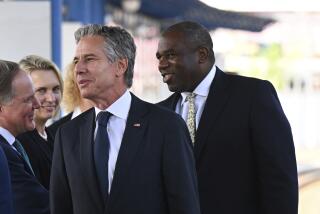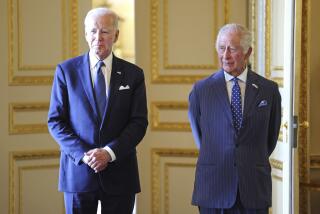With 2 Kisses, Bushes Seal Alliance Ties
- Share via
LONDON — President and Mrs. Bush wound up a weeklong trip to Europe on Thursday, celebrating a “special relationship” sealed with a kiss.
Make that two kisses.
As Barbara Bush arrived Thursday morning at No. 10 Downing St., Prime Minister Margaret Thatcher’s official residence, Denis Thatcher, the prime minister’s husband, stepped out and, lifting her hand to his lips, greeted her with a courtly kiss.
“Can we have the kiss again?’ a British photographer called out.
U.S. Initiative
This time, it was an American initiative, as Barbara Bush raised Denis Thatcher’s hand to the appreciative clicking of camera shutters.
It was a day for courtly gestures.
The “special relationship” between the United States and the United Kingdom may have waned in fact, as British power and importance in U.S. strategic thinking have waned. But the President nonetheless went out of his way to reassure the British that the vaunted Anglo-American friendship “is continuing and will continue.”
The President and prime minister met at No. 10 for nearly two hours, considerably longer than scheduled, and discussed a variety of subjects, including U.S. arms sales to Argentina, one of the few contentious issues between the two nations.
But the day was largely one of tone and ceremony, not decisions and policy.
“I would like to think that we pride ourselves on being among the foremost of United States’ friends, and we will always be,” Thatcher said before the two couples headed off to Buckingham Palace for lunch with the queen.
The President began his day with Thatcher, arriving on Downing Street to meet her while Secretary of State James A. Baker III met with the British foreign secretary, Geoffrey Howe.
The talks, Baker later told reporters, covered a range of issues, from the North Atlantic Treaty Organization’s decision to adopt Bush’s proposal on conventional arms talks to the status of peace efforts in the Middle East and southern Africa.
Bush assured Thatcher that his plan to reduce NATO’s military aircraft by 15% in exchange for larger cuts in Warsaw Pact forces would not effect the “dual capable” aircraft that Britain and France maintain to carry nuclear bombs. And the two agreed that the United States will continue to consult Britain before selling arms to Argentina, a sensitive subject here.
Britain and Argentina are still technically at war over the South Atlantic islands that the British call the Falklands and the Argentines the Malvinas. Britain has been at pains to ensure that the United States supplies no aid to Argentina that would allow the Argentines to attack British ships defending the islands.
The talks, both sides said, were cordial, although Bush commented several times on Thatcher’s reputation for bluntness.
“It’s only with friends that you can take off the gloves and speak from the heart,” he said after the two completed their meetings.
Barbara Bush, meanwhile, traveled to Brixton, a relatively poor, largely immigrant neighborhood to inspect an adult education center, a chance for her to observe how another country handles one of her chief interests--adult illiteracy.
The First Lady spent a few minutes making strudel dough with a cooking class. Asked if she had ever made strudel before, she said, “No, and my pie crust is nothing to write home about.”
At a literacy class, she chatted with female students from Ghana, Angola, Zaire and Ethiopia, and discussed details of the program with local officials.
“In some places, there are enormous waiting lists for literacy,” she said of adult education programs in the United States. “It’s heartbreaking.”
Over the next hour, the First Lady crossed the breadth of Britain’s social divide, driving from impoverished Brixton to Downing Street, where she joined the President and the Thatchers, and together they headed for the palace.
The joint motorcade caused havoc in London’s streets, jammed by a wildcat transit strike that had shut down the subway. But on the palace grounds there were no signs of the tribulations of everyday life, except that in deference to increasing threats of terrorism, the queen’s picturesque Beefeater guards now carry SA-80 automatic rifles.
Seated on gilt chairs covered in wine-colored velvet, the President and First Lady lunched on salmon mousse and duck, asparagus and mango ice cream--and admired the trappings of royalty.
“Beautiful,” Bush said as the royal band completed the national anthem. “I’ve never heard the ‘Star Spangled Banner’ played better, with all respect to the Marine Band.”
For the rest of the rainy London afternoon--with the exception of a brief pep talk to personnel at the U.S. Embassy--the President and First Lady rested from the rigors of the 9,000-mile journey that is to end this morning with their return to their vacation house in Maine.
And then to dinner, and more courtliness. Thatcher defended Bush against what has been until this week his most vexing criticism.
“I know some of the media in the West accuse us of failing to measure up to (Soviet President Mikhail S.) Gorbachev’s constant stream of initiatives,” Thatcher said in a dinner toast. “Of course, initiatives make a much better story than constancy and sticking to your principles, but in the real world it has been constancy and steadiness, particularly in defense, which has served us well for 40 years.”
Bush, in his toast, returned the compliment, honoring his hostess with words that appealed to her ambition: “Ladies and gentlemen, I ask all of you to rise, and raise our glasses to a British prime minister who holds the reins of history.”
More to Read
Sign up for Essential California
The most important California stories and recommendations in your inbox every morning.
You may occasionally receive promotional content from the Los Angeles Times.











